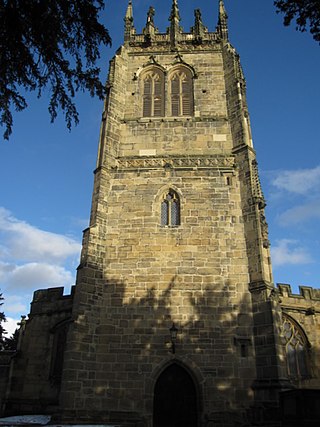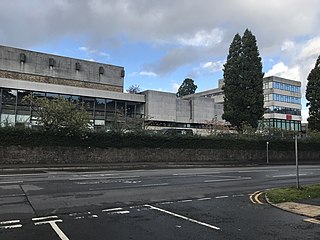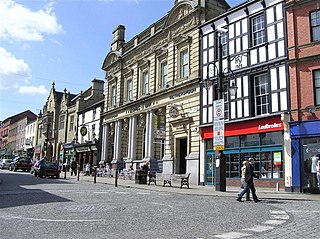
Wrexham is a city and the administrative centre of Wrexham County Borough in Wales. It is located between the Welsh mountains and the lower Dee Valley, near the border with Cheshire in England. Historically in the county of Denbighshire, and later the county of Clwyd in 1974, it has been the principal settlement of Wrexham County Borough since 1996.

Colwyn Bay is a town, community and seaside resort in Conwy County Borough on the north coast of Wales overlooking the Irish Sea. It lies within the historic county of Denbighshire. Eight neighbouring communities are incorporated within its postal district. Established as its own separate parish in 1844 with just a small grouping of homes and farms where the community of Old Colwyn stands today, Colwyn Bay has expanded to become the second-largest community and business centre in the north of Wales as well as the 14th largest in the whole of Wales with the urban statistical area, including Old Colwyn, Rhos-on-Sea, and Mochdre and Penrhyn Bay, having a population of 34,284 at the 2011 census.

Wrexham County Borough is a county borough, with city status, in the north-east of Wales. It borders the English ceremonial counties of Cheshire and Shropshire to the east and south-east respectively along the England–Wales border, Powys to the south-west, Denbighshire to the west and Flintshire to the north-west. The city of Wrexham is the administrative centre. The county borough is part of the preserved county of Clwyd.

Gresford is a village and community in Wrexham County Borough, Wales.

Penally is a coastal village, parish and community 1 mile (1.6 km) southwest of Tenby in Pembrokeshire, Wales. The village is known for its Celtic Cross, Penally Abbey, the neighbouring St. Deiniol's Well, WWI Practice trenches, and Penally Training Camp.

Erddig is a country house and estate in the community of Marchwiel, approximately 2 miles (3.2 km) south of Wrexham, Wales. It is centred on a country house which dates principally from between 1684 and 1687, when the central block was built by Joshua Edisbury, and the 1720s, when the flanking wings were added by its second owner, John Meller. Erddig was inherited by Simon Yorke in 1733, and remained in the Yorke family until it was given to the National Trust by Philip Yorke III in 1973.

Didcot power station is an active natural gas power plant that supplies the National Grid. A combined coal and oil power plant, Didcot A, was the first station on the site, which opened in 1970 and was demolished between 2014 and 2020. The power station is situated in Sutton Courtenay, near Didcot in Oxfordshire, England. Didcot OCGT is a gas-oil power plant, originally part of Didcot A and now independent. It continues to provide emergency backup power for the National Grid.

Broadcasting House was the headquarters of BBC Cymru Wales' radio, television and online services, situated in north Cardiff. The purpose-built facility opened in 1966 and consisted of three blocks containing studios, offices and technical facilities. In 2020 the BBC moved out, transferring to New Broadcasting House in Central Square, Cardiff. The building was demolished between 2021 and 2022, with the site to be used for new housing.

Wrexham city centre is the administrative, cultural and historic city centre of Wrexham, in North Wales and is the area enclosed by the inner ring road of the city. It is the largest shopping area in north and mid Wales, and the administrative centre of Wrexham County Borough. Many of its streets are pedestrianised.

Rhondda Cynon Taf is a county borough in South Wales. It is located to the north-west of Cardiff and covers an area of 424 km2 (164 sq mi). In 2021 the population was approximately 237,500.

Towers Cinema was a former cinema in Hornchurch, England. It was built in 1935 on part of the former Grey Towers estate and was noted for its Art Deco style of architecture. From 1973 it was used as a bingo hall until it closed in 2015. Despite the efforts of a local campaign to preserve the structure and to have it listed by Historic England, the building was demolished to make way for a Lidl supermarket.

Cardiff Bus Interchange (CBI) is a bus and transport interchange in the centre of Cardiff and forms part of The Interchange development, which also includes Wood Street House at the northern end with 318 for-rent apartments, two floors of office space, and four retail units on the ground floor.

Hightown is a suburban area of Wrexham, in Wrexham County Borough, Wales.

Plas Madoc is a housing estate and former electoral ward near Acrefair, in the Cefn community in Wrexham County Borough, Wales. It is located seven miles to the south-west of Wrexham, and contains The Land adventure playground, and a community-run leisure centre with a swimming pool. The area is one of the most deprived areas in Wales, and the fourth most deprived LSOA in Wrexham County Borough.

County Buildings is a Grade II listed building in Wrexham, Wrexham County Borough, Wales. It currently houses the Wrexham County Borough Museum and Wrexham Archives. By 2026, the building would become one museum, dedicated to both Wrexham and Welsh football heritage. The building is located between Saint Mark's Road and Regent Street in the city centre and Offa, bounded by Wrexham Cathedral to the west.

Wrexham Library is the main public library of Wrexham, Wales. Located in the city centre, adjacent to Llwyn Isaf, it opened in 1972, superseding the old carnegie library on Queen's Square.

The Soames Brewery Chimney is a Grade II listed former brewery chimney in Wrexham city centre, North Wales. It later became known as the Border Breweries Chimney, when the Soames Brewery was merged into Border Breweries in 1932.

Waterworld, formerly the Wrexham Swimming Baths, is a leisure centre in Wrexham, North Wales. Known for its hyperbolic paraboloid roof, the only roof of its type in Wales, the centre houses a set of swimming pools and a gym. The centre was opened in 1967, with a major refurbishment occurring in the 1990s, being re-opened by Elizabeth II in March 1998 under its current name.

The Grove Park School is a former school building in Wrexham, North Wales, which was home to a school between 1939 and 2003. The site has been derelict since 2003, and was proposed for demolition by Wrexham council, until the Welsh Government listed the building in 2016, following a campaign to preserve it. Various bids have been made to re-develop the site, including it becoming part of Coleg Cambria, being converted into a new primary school, a Welsh-medium secondary school, a medical training facility, or part of a national gallery.

Chester Street is a street in Wrexham city centre, North Wales. It was once a main north–south road on the edge of the centre of Wrexham. The street has several listed buildings, as well as Wrexham's civic centre containing various council, memorial and leisure buildings, Coleg Cambria's Yale campus, Tŷ Pawb and various historical buildings now demolished.























